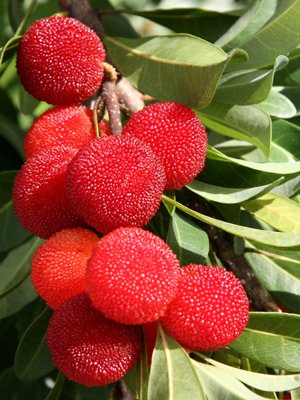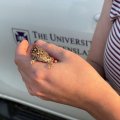
Early last century a New Zealand nurseryman planted the first seeds of a Chinese fruiting plant called Yang Tao, or Chinese Gooseberry.
Fifty years later, New Zealand exporters renamed the fruit ‘Kiwifruit’ for the rapidly growing US market.
Today, more than a million tonnes of kiwifruit are shipped around the world each year, with Italy and New Zealand the largest producers.
UniQuest, The University of Queensland’s main commercialisation company, plans to launch a similar agribusiness success story with the global development of another Chinese fruit crop known as Yang Mei, Chinese Bayberry, or Red Bayberry.
The attractive Red Bayberry fruit are similar in size to cherries and have been grown in China for centuries.
Every summer they are enthusiastically sought after for perceived health benefits and their refreshing and delicious flavour.
The fruit, however, have never been established as a crop outside of China.
New varieties of Red Bayberry, developed at UQ, are now thriving in the State’s subtropics, producing commercial yields of fruit just three years after transplanting.
Unlike the New Zealand growers, UniQuest has ensured the intellectual assets behind UQ’s development of the Red Bayberry are protected so that royalties and license fees can be generated.
UniQuest is now looking to partner with investors to develop the crop here in Australia and also to establish a global production and marketing network.
“We have had a lot of interest from Australian fruit growers, and a small group along the east coast of Australia will receive their first trees to trial early next year,” said UniQuest Manager of Innovation and Commercial Development, Cameron Turner.
“With the support of an investor, a new Australian food company could be delivering this delicious summer fruit to Australian and international consumers within five years,” Mr Turner said.
Pink Lady apples, macadamias, cashews and olives, now firm family favourites, are relatively new commercial crops for Australia which were supported by forward thinking investors.
UniQuest Managing Director, David Henderson, said the company had a proven track record of commercialising university-based agricultural research.
“Private investment gave UniQuest start-up Aussie Colours a boost to launch its ornamental, drought-hardy native Australian plants internationally, and that enterprise has been growing steadily since 2007,” Mr Henderson said.
“We have also negotiated licences for sugarcane innovations with key players in that global industry, and facilitated a number of other commercial deals for university agribusiness projects.
“The Red Bayberry fruit provides an exciting opportunity for an astute investor with an interest in Australian food and agriculture.”
Focus group research shows consumers enjoy the berry-like fruit.
Perhaps most similar to mulberries in flavour, the fruit is described as juicy, ‘explosive’, plump and fleshy.
Red Bayberry is fresh and crisp, has an intense flavour and good balance of sweetness and tartness.
With the current crop ripening, now is the time for interested parties to arrange a site visit to the University’s plantation on the Sunshine Coast with Cameron Turner.
“We can introduce them to the research team and the growers and let them see for themselves how this might just be the new venture they’ve been looking for,” Mr Turner said.
Media enquiries: Leanne Wyvill +61 7 3365 4037, 0409 767 199 or l.wyvill@uniquest.com.au
About UniQuest
Established by The University of Queensland in 1984, UniQuest is widely recognised as one of Australia’s largest and most successful university commercialisation groups. With more than 80 staff and group revenues exceeding A$320 million in the past five years, the company is also benchmarked in the top tier of technology transfer worldwide. It has created more than 60 companies, and since 2000 UniQuest and its start-ups have raised more than $340 million to take university technologies to market. UniQuest commercialises innovations developed at The University of Queensland and its commercialisation partner institutions: the University of Wollongong, University of Technology Sydney, James Cook University, University of Tasmania, the Mater Medical Research Institute and two ARC Centres of Excellence. UniQuest also provides access to an expansive and exclusive network of independent academics to tailor a consulting or project R&D solution to meet the diverse needs of industry and government, facilitating some 500 consulting, expert opinion, testing, and contract research services each year. UniQuest is also a leading Australasian provider of international development assistance recognised for excellence in technical leadership, management and research. Working with agencies such as AusAID, NZAID, the Asian Development Bank and the World Bank, UniQuest has developed and implemented more than 400 projects in 46 countries throughout the Pacific, South-East Asia, the Indian sub-continent and Africa. For more information about UniQuest, please visit www.uniquest.com.au.


